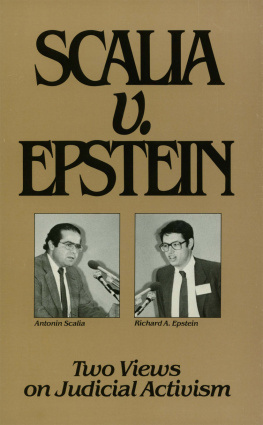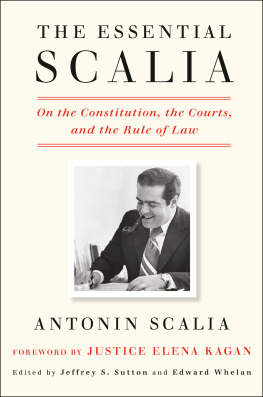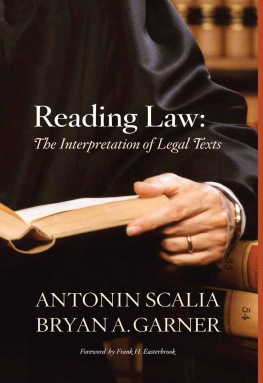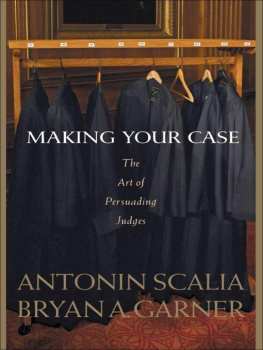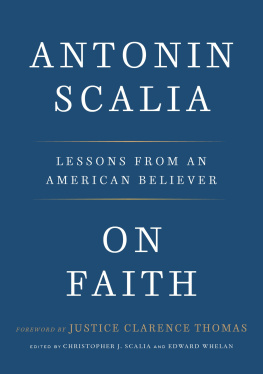ECONOMIC AFFAIRS AS HUMAN AFFAIRS
Antonin Scalia
T he title of this articleEconomic Affairs as Human Affairsis derived from a phrase I recall from the earliest days of my political awareness. Dwight Eisenhower used to insist, with demonstrably successful effect, that he was "a conservative in economic affairs, but a liberal in human affairs." I am sure he meant it to connote nothing more profound than that he represented the best of both Republican and Democratic tradition. But still, that seemed to me a peculiar way to put itcontrasting economic affairs with human affairs as though economics is a science developed for the benefit of dogs or trees; something tltat has nothing to do with human beings, with their welfare, aspirations, or freedoms.
That, of course, is a pernicious notion, though it represents a turn of mind that characterizes much American political thought. It leads to the conclusion that economic rights and liberties are qualitatively distinct from, and fundamentally inferior to, other noble human values called civil rights, about which we should be more generous. Unless one is a thoroughgoing materialist, there is some appeal to this. Surely the freedom to dispose of one's property as one pleases, for example, is not as high an aspiration as the freedom to think or write or worship as one's conscience dictates. On closer analysis, however, it seems to me that the difference between economic freedoms and what are generally called civil rights turns out to be a difference of degree rather than of kind. Few of us, I suspect, would have much difficulty choosing between the right to own property and the right to receive a Miranda warning.
In any case, in the real world a stark dichotomy between economic freedoms and civil rights does not exist. Human liberties of various types are dependent on one another, and it may well be that the most humble of them is indispensable to the othersthe firmament, so to speak, upon which the high spires of the most exalted freedoms ultimately rest. I know no society, today or in any era of history, in which high degrees of intellectual and political freedom have flourished side by side with a high degree of state control over the relevant citizen's economic life. The free market, which presupposes relatively broad economic freedom, has historically been the cradle of broaa political freedom, and in modem times the demise of economic freedom has been the grave of political freedom as well. The same phenomenon is observable in the small scales of our private lives. As a practical matter, he who controls my economic destiny controls much more of my life as well. Most salaried professionals do not consider themselves "free" to go about wearing sandals and nehru jackets, or to write letters on any subjects they please to the New York Times.
My concern in this essay, however, is not economic liberty in general, but economic liberty and the judiciary. One must approach this topic with the realization that the courts are (in most contexts, at least) hardly disparaging of economic rights and liberties. Although most of the cases you read of in the newspaper may involve busing, or homosexual rights, or the supervision of school districts and mental institutions, the vast bulk of the courts' civil business consists of the vindication of economic rights between private individuals and against the government. Indeed, even the vast bulk of noncriminal "civil rights" cases are really cases involving economic disputes. The legal basis for the plaintiffs claim may be sex discrimination, but what she is really complaining about is that someone did her out of ajob. Even the particular court on which I sit, which because of its location probably gets an inordinately large share of civil cases not involving economic rights, still finds that the majority of its business consists of enforcing economic rights against the governmentthe right to conduct business in an unregulated fashion where Congress has authorized no regulation, or the right to receive a fair return upon capital invested in a rate-regulated business. Indeed, some of the economic interests protected by my court are quite rarefied, such as a business's right to remain free of economic competition from a government licensee whose license is defective in a respect having nothing to do with the plaintifrs interestsfor example, one radio station's challenge to the license of a competing station on the basis that the latter will produce electronic interference with a third station.
Fundamental or rarefied, the point is that we, the judiciary, do a lot of protecting of economic rights and liberties. The problem that some see is that this protection in the federal courts runs only by and large against the executive branch and not against the Congress. We will ensure that the executive does not impose any constraints upon economic activity which Congress has not authorized; and that where constraints are authorized the executive follows statutorily prescribed procedures and that the executive (and, much more rarely, Congress in its prescriptions) follows constitutionally required procedures. But we will never (well, hardly ever) decree that the substance of the congressionally authorized constraint is unlawful. That is to say, we do not provide a constitutionalized protection except insofar as matters of process, as opposed to substantive economic rights, are concerned.
There are those who urge reversal of this practice. The main vehicle availableand the only one 1 address specifically hereis the due process clause of the Fifth and Fourteenth Amendments, which provides that no person shall be deprived of "life, liberty, or property, without due process of law." Although one might suppose that a reference to "process" places limitations only upon the manner in which a thing may be done, and not upon the doing of it, since at least the late 1800s the federal courts have in fact interpreted these clauses to prohibit the substance of certain governmental action, no matter what fair and legitimate procedures attend that substance. Thus, there has come to develop a judicial vocabulary which refers (seemingly redundantly) to "procedural due process" on the one hand, and (seemingly paradoxically) to "substantive due process" on the other hand. Until the mid-1930s, substantive due process rights were extended not merely to what we would now term "civil rights"for example, the freedom to teach one's child a foreign language if one wishesbut also to a broad range of economic rightsfor example, the right to work twelve hours a day if one wishes. Since that time, application of the concept has been consistently expanded in the civil rights field (Roe v. Wade is the most controversial recent extension) but entirely eliminated in the field of economic rights. Some urge that it should be resuscitated.
I pause to note at this point, lest 1 either be credited with what is good in the present system or blamed for what is bad, that it is not up to me. (I did not have to make that disclaimer a few years ago, when 1 was a law professor.) The Supreme Court decisions rejecting substantive due process in the economic field are clear, unequivocal and current, and as an appellate judge 1 try to do what I'm told. But 1 will go beyond that disclaimer and say that in my view the position the Supreme Court has arrived at is goodor at least that the suggestion that it change its position is even worse.

